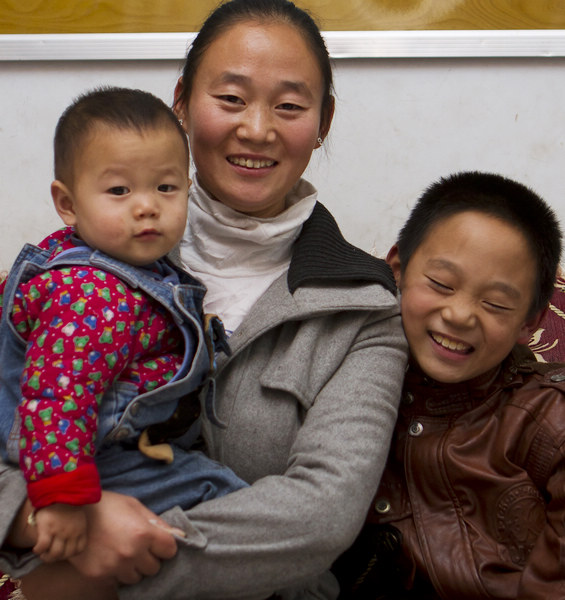|
 |
|
Chen Aihua enjoys having two sons, Wang Zichen (in her arms) and Wang Ziqin, 8. Not everyone who is eligible for more than one child has chosen that option. Zhang Tao / China Daily |
New challenges
Fertility in the special zones has decreased as economic development and urbanization have increased. The national average is less than 1.5 children over a woman's lifetime, which is well below the replacement level of 2.1, said Lu Jiehua, a sociology professor at Peking University. In Yicheng, the rate stands at 2.0 children.
China's total fertility rate "is the lowest among the developing world and even among the lowest in industrial countries," Lu said. "To increase human productivity is even more difficult than curbing it."
The government credits family planning with averting 400 million births, said Li Bin, minister of the National Population and Family Planning Commission. Less pressure on food and other critical resources allowed China to achieve its economic wonder of the past 30 years and largely improve people's quality of life, she said.
Li did concede, however, that the success of family planning also led to surging demographic challenges - a serious and rapid increase in the aged as a proportion of population, a skewed sex ratio at birth and a dwindling labor force.
Gu, the Renmin University demographer, once said that for the first half of his life he worked to curb population growth and for the rest he would strive for relaxation of the family planning policy. He would like to see two children be allowed nationwide to help address the problems that Li cited.
But decision-makers have yet to reach consensus on easing the family planning policy and are highly cautious about a change, said Yuan Xin, a professor at Nankai University's population and development institute in Tianjin.
Research based on the 2010 census put the total fertility rate at nearly 1.5 but some academics doubt that figure's credibility. They say many children born in contravention of the family planning policy might not be counted and a fertility rate of around 1.8 was more trustworthy, Lu said. "Thereafter, the agenda to ease the policy has been put off," he said.
Personally, Lu agreed with 1.5 as the rate.
'What if . . . ?'
The fears of uncontrolled population today resurrect memories from 26 years ago, when Liang made his proposal and its approval shocked many officials in Yicheng county.
"I couldn't believe my ears when Professor Liang was talking about allowing people to have a second child," said Feng Caishan, who was then the county chief of Longhua town. "Are you sure he said 'second'?" Feng asked others.
"When we told villagers about the news, they welcomed the decision," Feng said. But like many local cadres, he worried about the possible fallout. "What if they want a third kid, or a fourth?"
Population did not surge. And the policy change in Yicheng made enforcement easier.
Before 1985, villagers often cursed Che Yuelian, a local enforcer, when she walked down the street. "Even my mom couldn't understand me." After the policy eased, "Our relations with villagers were much more harmonious."
Che is 65 now and still wears the badge to work at what she described as "the most difficult job on earth" before 1985.
In the early stages, financial punishment was used to enforce the policy. "Anyone who got married or had a child earlier than the required age would be fined 100 yuan," An Dousheng, Yicheng's family planning chief 1980-1990, remembered. At the time, An said, the local average monthly income was 20 to 30 yuan.
In time, local enforcers realized that a relaxed policy meant people were more willing to abide by the rule. The 2000 census showed that only 0.7 percent of families had broken the rules and had more than two children. The provincial average was 7.49 percent and the national average 4.29 percent.
"Experiments in these areas made us rethink the policy, particularly in terms of huge implementation costs, in money, staff, and public perception," Lu, the sociologist, said.
Latest development
Local governments have fine-tuned the policy for years. Around 1990, for example, Shanghai pioneered a policy letting urban couples who are only children to have a second child. Last month, Central China's Henan province became the last province in the country to make that allowance.
Meanwhile, family planning departments have issued a series of policies and measures favoring families that strictly follow family planning policy, particularly in rural areas where more children are considered vital to support the parents in old age.
To date, more than 12 billion yuan has been spent on subsidies for 300,000 such families, benefiting more than 4 million people, Li Bin reported recently to the China Family Planning Association, a government-backed civil organization to help carry out policies.
Sun Ruisheng in Shanxi contributed to this report.
